

铌酸锂调控固态电解质电场结构促进锂离子高效传输!
描述
聚合物基固态电解质得益于其易加工性,最有希望应用于下一代固态锂金属电池。目前,聚合物基态电解质的离子电导率提升策略多为加入导锂陶瓷以构建离子传输通道,其提升程度有限。电场在锂离子输运过程中存在重要影响,目前研究中有关电场对锂离子传输的影响机制尚不明确。
近日,清华大学深圳国际研究生院康飞宇教授、贺艳兵副教授和吕伟副教授等人在Science China Materials发表研究论文,将兼具高离子电导率和高介电常数的铌酸锂嵌入聚偏氟乙烯基体中,设计了一种新型复合固态电解质。
本文要点
1) 铌酸锂颗粒有效调节电解质内部电场结构,增强了离子输运方向电场强度,实现了离子电导率的大幅提升(7.39×10−4 S cm−1,25°C)。
2) 该电解质匹配高镍正极和锂金属负极的固态电池可稳定循环1000次以上,容量保持率为72%。 该研究为设计下一代固态锂电池用高离子电导复合固态电解质提供了新的策略。
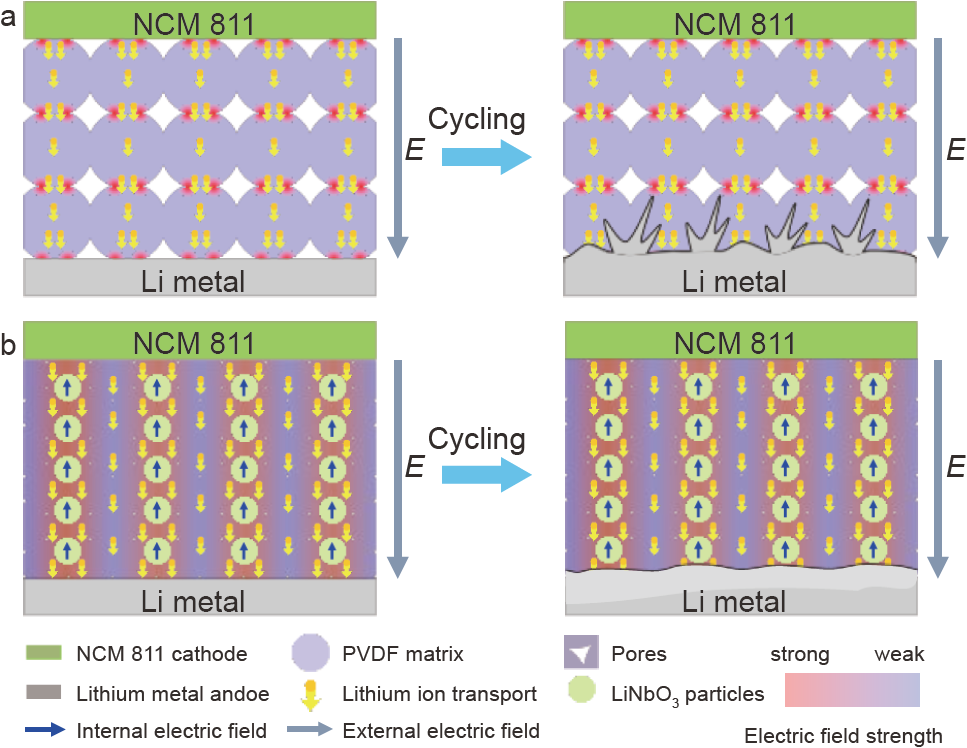
Figure 1. Working mechanisms of solid-state NCM811 /Li batteries using NPC and PVDF electrolytes during long cycles. (a) In the NCM811/PVDF/Li batteries, the local aggregation of electric field in PVDF hinders the Li+ uniform transport and promotes Li dendrite growth. (b) In the NCM811/NPC/Li batteries, the enhanced electric field in NPC along the Li-ion transport direction and uniform electric field at the interface with Li metal contribute to fast Li+ conduction and uniform Li platting/stripping.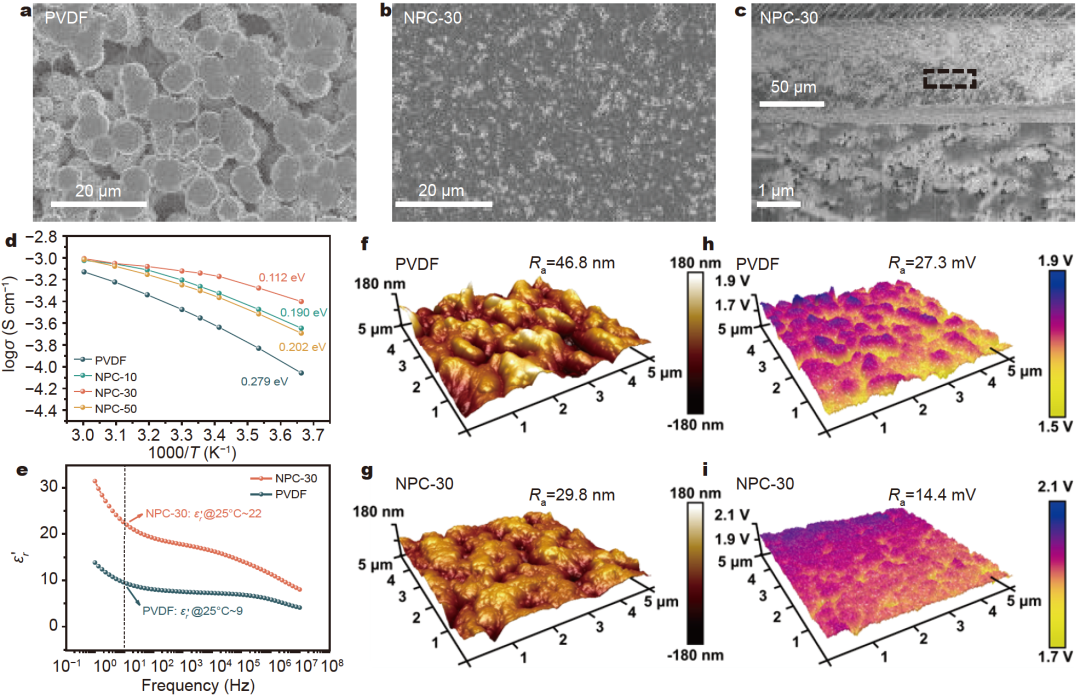
Figure 2. Morphology and physicochemical characterizations of PVDF and NPC electrolytes. Surface SEM image of (a) PVDF and (b) NPC-30 electrolytes. (c) Cross-sectional SEM images of NPC-30 electrolyte. (d) Arrhenius plots of ionic conductivities of PVDF and NPC-based electrolytes. (e) Real part (ɛr′) of relative permittivity at different frequencies for PVDF and NPC-30 polymer films. AFM morphology images of (f) PVDF and (g) NPC-30 and the corresponding interfacial potential images (h, i).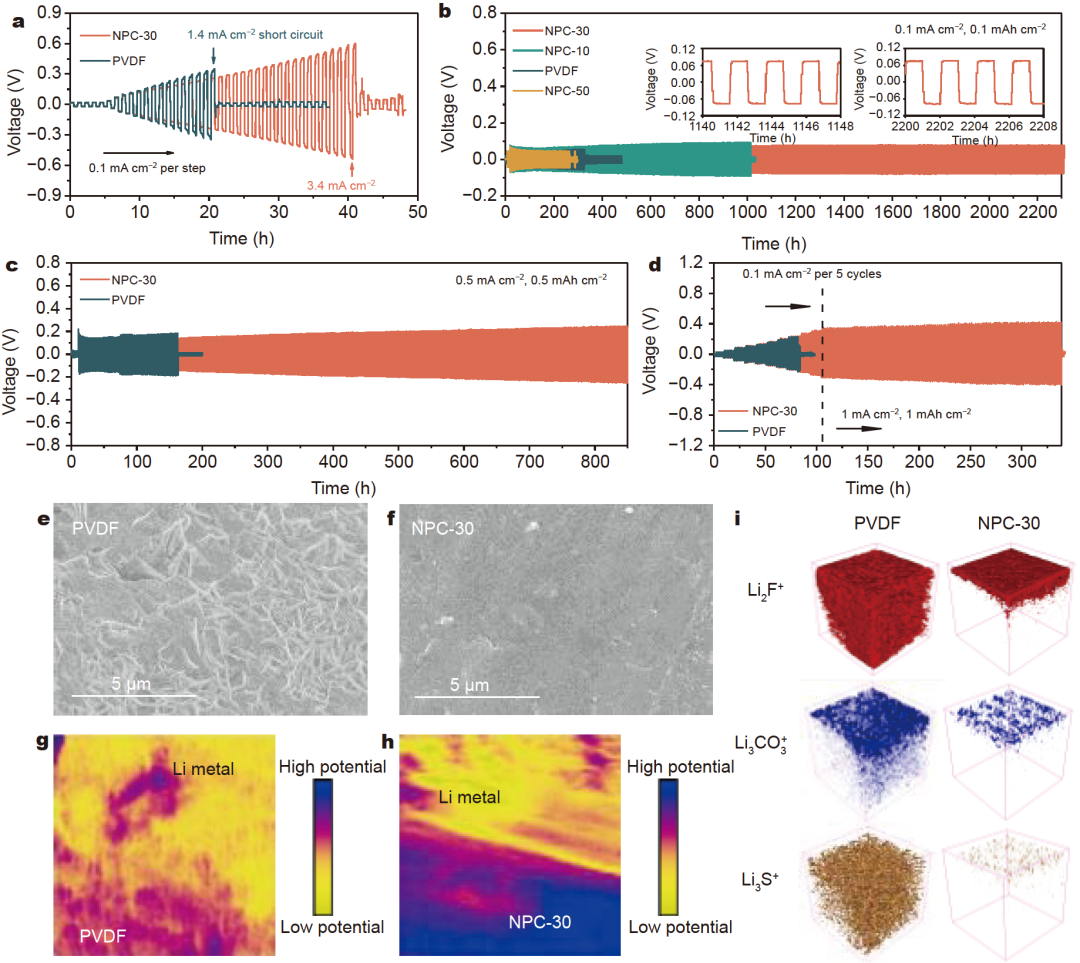
Figure 3. Properties of Li-symmetric cells using PVDF and NPC-30 electrolytes. (a) CCD of the Li/PVDF/Li and Li/NPC-30/Li cells. Cycling curves of Li-symmetrical cells with PVDF and NPC-based electrolytes at current density of (b) 0.1 mA cm−2, (c) 0.5 mA cm−2 and (d) 1 mA cm−2. SEM images of the Li metal surface after cycling at 0.1 mA cm−2 for 100 h using (e) PVDF and (f) NPC electrolytes. Potential distribution of the cross-section for the interface between Li metal and (g) PVDF, (h) NPC-30 electrolyte from KPFM. (i) 3D ToF-SIMs visual maps of the distributions of LiF+, Li2CO3+ and Li2S+ species at the interface of Li metal after cycling for 100 h using PVDF and NPC-30.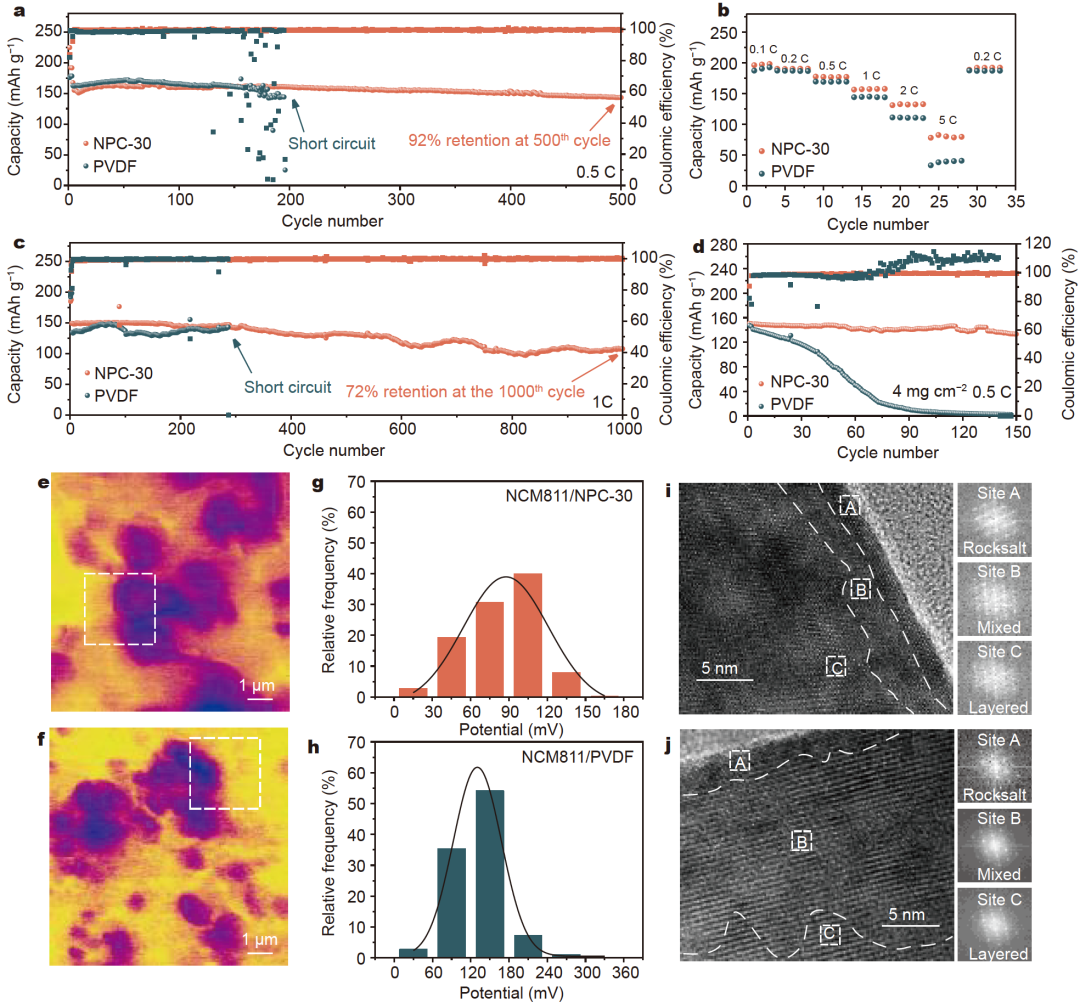
Figure 4. Properties of solid-state NCM811/Li solid-state batteries using PVDF and NPC-30 electrolytes. Long-term cycling performance of NCM811/Li cells using PVDF and NPC-30 electrolyte at (a) 0.5 C and (b) 1 C. (c) Rate capacities of NCM811/Li cells using PVDF and NPC-30 electrolyte. (d) Cycling performance of NCM811/Li cells with higher cathode loading of 4 mg cm−2. Interfacial potential images of (e) NCM811/NPC-30 and (f) NCM/PVDF. Gauss statistic distribution histograms of interfacial potential for (g) NCM811/NPC-30 and (h) NCM811/PVDF. TEM and FFT images of cycled NCM811 cathode with (i) NPC-30 and (j) PVDF in full cells.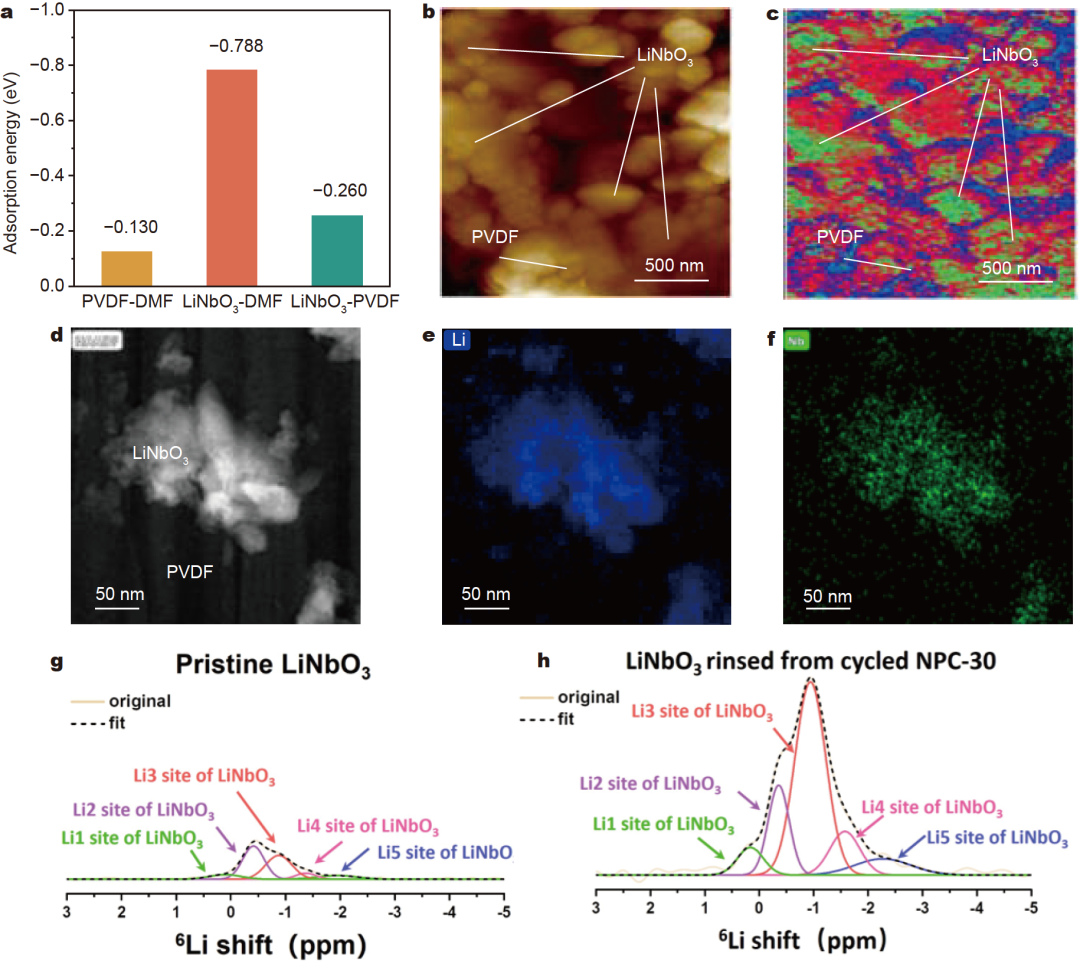
Figure 5. Characterizations of the ion transport mechanism of PVDF and NPC-30 electrolytes. (a) DFT results for adsorption energies. (b) AFM image and (c) corresponding nano-IR overlap of C=O vibration of DMF at 1663 cm−1. (d) HAADF-TEM image of NPC-30 electrolyte and (e) corresponding EELS mapping of Li element and (f) EDS mapping of Nb element. (g) 6Li NMR spectra of pristine LiNbO3. (h) 6Li NMR spectra of rinsed LiNbO3 from NPC-30 after cycling in the 6Li/NPC-30/6Li cell.
审核编辑:刘清
-
锂离子电池的最新正极材料:掺锰铌酸锂?2016-01-19 6311
-
针对电池的安全性方面对固态电解质材料的研究分析2018-09-04 6111
-
非对称凝胶聚合物电解质膜,可促进锂离子传输和均匀沉积2020-04-08 5189
-
将商业化锂离子电池中的液态电解质替换什么解质?2020-06-09 3161
-
锂离子电池堆电解质的要求及对电池性能的影响2020-12-30 5387
-
简述锂枝晶穿过陶瓷固态电解质的机制及缓解策略2021-04-29 4328
-
钠离子电池的电解质分类2022-10-09 6299
-
如何有效构建固体电解质的高亲锂界面?2022-11-24 2020
-
使用LLZO/ PEO复合电解质组装固态锂离子电池2022-11-28 3236
-
锂金属电池室温固态聚合物电解质的锂离子传导机制2023-04-15 4056
-
固态电解质离子传输机理解析2024-01-19 5515
-
不同类型的电池的电解质都是什么?2024-02-27 3524
-
固态电池中复合锂阳极上固体电解质界面的调控2024-10-29 1619
-
一种薄型层状固态电解质的设计策略2024-12-31 1569
-
清华大学:自由空间对硫化物固态电解质表面及内部裂纹处锂沉积行为的影响2025-02-14 798
全部0条评论

快来发表一下你的评论吧 !

